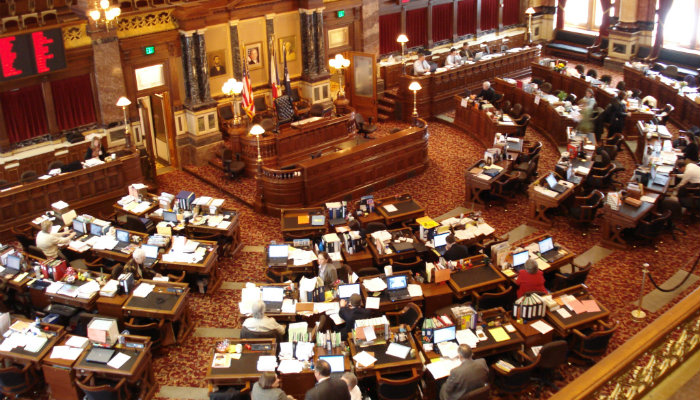
Entrepreneurs, unlike industry sectors such as banking, agriculture and health care, don’t typically have a unified voice or paid lobbyists to influence public policy. So how do Silicon Prairie policy makers view the startup community?
“Policy makers are interested in startups and want to promote them,” said Senator Patty Pansing-Brooks, a member of the Nebraska Legislature from Lincoln. “Startups create the best opportunities for new jobs and reinventing our business and industry.”
So how effective are policy makers at support startups?
That is the subject of a legislative interim study resolution in Nebraska, LR 277. The resolution, co-sponsored by Senator Pansing-Brooks and Senator Adam Morefeld of Lincoln, seeks to identify needs and gaps in training, technology skills and other factors that impact the entrepreneurial ecosystem.
“It’s clear that we have seismic changes ahead due to technology,” Senator Pansing Brooks said. “We have got to regroup and re-think how we’re going to look at things, technology and jobs.”
A struggle for priority in Kansas
This isn’t to say policy makers have not made an effort to support startups. States in the Silicon Prairie region have implemented angel investment tax credits, funded innovation grant and loan programs, and created frameworks for crowdfunding platforms. In some instances, however, initiatives like these are squeezed out by more pressing matters.
“In Kansas, we’ve got bigger problems,” said Melissa Roberts, Marketing Director for the Johnson County Enterprise Center. “There are some great advocates, but it’s not a top priority.”
The Kansas angel investment tax credit is set to expire next year. There was an effort to renew it during this year’s legislative session but it was a casualty of more pressing matters. According to Roberts, it seems possible if not likely that the credit will be renewed in 2016.
Roberts also sees economic development “border wars” as part of the picture. She pointed to Kansas City’s Digital Sandbox as an example. “The process in Kansas City is to go to 1 Million Cups, have a great idea, flesh it out at a startup weekend,” Roberts said. “At this point state lines don’t matter. But to be eligible for proof-of-concept funding from Digital Sandbox, you have to be a Missouri company – unless you’re in Olathe.”
Digital Sandbox was started through a grant from the U.S. Department of Commerce and receives financial support from a number of Missouri-based companies and organizations. In July, a partnership with the City of Olathe, Kansas was announced and now Olathe companies can submit ideas and receive funding.
Iowa seeks the right recipe for angel tax credits
Policy makers in the Silicon Prairie region do pay attention to, and learn from, experiences in other states. For example, the Iowa legislature made changes to the state’s angel investment tax credit this year in an effort to generate more interest. Conversely, the Nebraska legislature increased the amount of available angel investment tax credits due to high demand.
Tina Hoffman, Marketing & Communications Director for the Iowa Economic Development Authority, said the changes made this year should improve Iowa’s competitive position in the region.
“Prior to the changes, the angel tax credits were not fully utilized,” Hoffman said. “Only about half of the authorized credits have been issued in any one year, which indicates the program is ineffective and uncompetitive.”
“Government has always struggled to keep up with the tech industry”
Changes made this year include raising the credit percentage from 20% to 25%, making the credits refundable, and focusing the credits on individual angel investors to prevent competition with other tax credit programs more targeted to institutional investors.
There are also several public-sector funding sources in Silicon Prairie states directed toward innovation and idea generation.
“We have to be mindful that we’re talking about tax dollars, and these investments need to be appropriate and helpful but not overly risky,” Hoffman said.
Nevertheless, Senator Pansing-Brooks sees the importance of public investment in supporting startups.
“We’re going to have to spend dollars toward generating ideas,” she said.
Regional state legislatures continue to play catch-up
Is there a sense that the digital economy is causing policy makers to deal with new and increasingly complex issues?
“Not even just a little bit,” Senator Pansing-Brooks said. “The first machine age has run its course and sucked every dollar out of it. Now we’re seeing a huge change in jobs.”
“Computers will be becoming better and better at things that people do now,” Pansing-Brooks said. “The ability to create new ideas is our greatest strength. That’s where humans have the advantage.”
Mike Colwell, Executive Director of Square One DSM in Des Moines, sees the importance of managing expectations concerning government’s ability to stay on top of rapid technological change.
“Government has always struggled to keep up with the tech industry,” Colwell said. “The process of government takes time, and it’s not unusual to see government struggle to keep up.”
This is particularly challenging in Silicon Prairie states where the legislatures do not meet year-round.
“It’s probably not appropriate to think government can keep up, especially with 6 or 8 month gaps between legislative sessions,” Colwell said. “It would be nice, but understand the reality. They’d have to be in session 24-7.”
Regardless, policy makers will continue to pay more attention to issues surrounding the startup community.
“It’s incumbent upon all of us to think about what we’re going to do,” Senator Pansing-Brooks said.
—
Rod Armstrong works for AIM in Lincoln, Nebraska.




